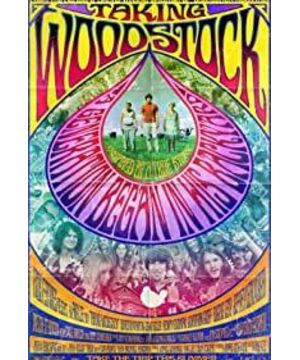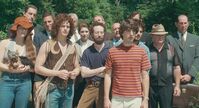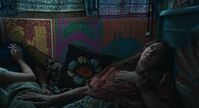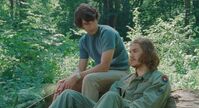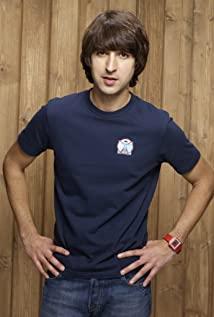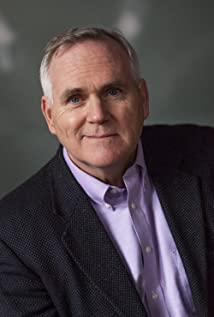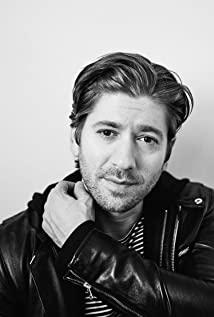Taking Woodstock, the focus is on Taking. Compared with "Pirate Radio", which was popular among literary and artistic youths, and even "Almost Fame", this movie, which is closely related to music, does not have the characteristics of a musical movie, and even the whole film did not appear for more than 1 minute. Woodstock has only been weakened into a narrative background in the musical performance of the film. I don’t know if Director Ang Li finds it difficult to pick up the courage to manipulate this kind of purely American music film, or deliberately choose other angles to project some of his inner desires. But what is certain is that Cannes's reaction to the film has been tepid. Focusing on individual characters under historical events, the subsequent development of the theme about human nature seems to be the typical pattern of Li Ang’s recent creations, and perhaps this is very popular in Venice-"Brokeback Mountain" and "Lust Caution" all rely on this setting Picking the Golden Lion-but not necessarily suitable for everyone's appetite.
The only real departure from the "Angle Lee Model" of "Making Woodstock Music Festival" is that the whole film lurks smoothly on a docile plot line, without violent fluctuations and conflicts. Previous films often set the shocking head shots at the climax and final stages of the film, and there is no trace in this film: we are constantly experiencing the baptism of death in "Ice Storm", "Lust Caution" and "Brokeback Mountain". Even in the debut "Pushing Hands", there are scenes in which Yin Xiong's father confronts restaurant employees with Tai Chi, and in "Making Woodstock Music Festival" Li An firmly restrains the narrative climax from the edge of the outbreak, extremely The introverted presentation of the breakdown and rebirth of a family in the form of dialogue undermines the Hollywood narrative law he should abide by as a standard New York University film student. This satisfies the director's artistic innovation (only for a director like Li Ang) The result of the breakthrough is naturally a price.
Even so, the film can still be divided into four parts according to the typical Hollywood narrative technique. The beginning part is from the opening to the 23rd minute, and from the 23rd minute to the 61st minute is foreshadowing. This is also the longest part, occupying 38 minutes. In the 94th minute, the development stage of the film was completed, which was 33 minutes long, and the last 25 minutes was the climax and ending.
Opening: "Who's paying for all that?"
The film opens with a set of fixed shots, explaining the surrounding environment of a hotel operated by Elliott living in White Lake. It can be seen that the place is far away from the crowds and the trees and grass are lush, which provides the sponsors of the future music festival to approve the location. Material basis. In this group of shots, the first important person to appear is Eliot’s father. He is repairing the roof of the hotel, while his wife is receiving the first visitor to the hotel, and then walks into the room. Watch TV. The content of TV is nothing more than wars, crossfires, commotions and American moon landings all over the world, which implies the current situation and economic depression in the United States.
In fact, the purpose of the opening paragraph of the whole movie is to create conditions for the temporary relocation of the Woodstock Music Festival. The family status of the male protagonist's family in this diplomatic generation. These two clues complement each other in a mapping nature, forming the "Manufacturing" All the narratives of "Woodstock Music Festival": Ang Lee’s ambition is not to present the whole story of a historical event in complete detail. The physical and mental exhaustion caused by the epic "Lust Caution" almost determines the ease of this work. In the tone, Ang Lee just borrowed "Woodstock" as a guise of anti-war, democracy, freedom and a series of hippie characteristics to tell the development process of a family's negation and negation. In the end, fathers and sons who yearn for freedom will break through that. The bondage of the miser's mother gives her spiritual freedom. Then the two main lines of the opening paragraph are presented in this way, which is quite reasonable.
The attitude of the miser’s mother towards customers, bank chasers, and even fathers and daughters, was dramatically portrayed as a miser who does not lose to Grandet, which to a certain extent reflects the psychology and living conditions of the people in the market during the special period. The first obstacle to the realization of the ultimate theme of the film: She is not only the person with veto power to hold the Woodstock Music Festival, but also the biggest imprisonment for her husband and son to get a new life in this incident. Obviously, the meaning of this character on an abstract level is greater than the meaning of setting as a narrative element, because at its root, the character of Elliott’s mother is a concentrated expression of conservative thinking. It is precisely because of the disputes of the current situation that the common people are in their hands. Their lives are extremely disturbed, and their fear of bankruptcy erodes their hearts. At this time, a free feast like the Woodstock Music Festival is needed to liberate their minds.
In order to further shape the image of his mother, Ang Lee set up three paragraphs, one is a contrast, the other is an illustration, and the third is a testimony. The dialogue between Eliot and his sister was to use her to make fun of her mother's stinginess again, and the meeting held by Eliot as the head of the chamber of commerce, even more vividly portrayed the faces of the citizens like mothers. At the same time, the pioneer theater troupe living in the warehouse of Eliot's house is a portrayal of the group portrait that is lingering under the squeeze of the mother, the queen, and their desire for art to be recognized and to fill the physical and spiritual famine. At this point, Ang Lee has basically completed the shaping of the citizens around Baihu, and it has also made it possible for such an impoverished area to hold the "hot potato"-Woodstock Music Festival, which is unaccepted.
As the male protagonist, Eliot has always been an image of being bound by so-called responsibility and unable to fly. For those former friends who travel the country and pursue their dreams, he is always eager to keep in touch and tactful on the other. He refused the request of their counterparts, and had to use his wages for his mother’s loan repayment business. For such a boy whose life and money were fully occupied by his mother, Ang Lee designed the ending for him to release his nature and complete it. A Nirvana action from extreme to the other extreme, and at this time the Woodstock Music Festival became an opportunity and was introduced into the narrative structure of the entire film. It can be seen that the title of the film's title is "Taking" rather than "Woodstock". In full view, Eliot dialed the phone of the person in charge of the music festival to end the opening part of the film. At this time, Eliot had decided to use his actions to start saving this powerful oppressive and exploiting territory.
Foreshadowing: "Looks like we can work with this."
The bedding part of the film begins with a helicopter landing-in the open space in front of the motel run by Elliott’s mother, Elliott used his mother’s most precious bed sheet to form a cross to explore Woodstock’s music. Mike and his party at the festival site were able to land. Obviously, this violated the "rules" of Eliot's mother. Afterwards, the appearance of the naked pioneer troupe actors made the miser even more collapsed. At this time, the confrontation between freedom and feudalism began the first struggle. People who were naked in front of the helicopter that descended were performing religious rituals like worshipping idols, and those who stepped down from the helicopter, It is the backbone of the music festival that will soon be triggered. The handshake under the gaze of Elliott's mother suggests that young people are about to join forces to resist the hegemony of the world.
The holding of the new movement must have an economic and organizational basis. The paving part of the film basically revolves around these two aspects. In fact, the whole film’s remarks on the theme of freedom are at the end of the paving part, that is, the whole film. In the middle part, the leading actor Eliot spoke to reporters attending the press conference.
The development of the two aspects of the foundation must naturally be based on the anti-traditional and anti-conservative tone. The new forces headed by Michael, under the coordination of Eliot as the central axis, began to carry out a major transformation of Baihu to say goodbye to the old and welcome the new. Input funds, output propaganda, and surround the citizens of Baihu who had been explained one by one at the beginning from all aspects. In a semi-deceptive and semi-coaxing way, the psychological changes of local residents from resistance to trust to welcome—the history is surprisingly similar. This is like a measure taken in my country's exploration of one transformation and three transformation activities from 53 to 56 years. The final result of the negotiation is a win-win situation. When designing these paragraphs, Ang Lee made full use of the comic tone of the film itself, combined and collaged with very small paragraphs, and completed the macro narrative that is truly relevant and "manufacturing" in a small view. .
While actively telling the first narrative clue, Ang Lee naturally did not forget to intersperse it, staggering the story of the Elliott family. At this time, the father, who was always unknown in the opening paragraph, has learned to find his own place in this new democratic movement and actively participate in it. He gained a sense of existence while also gaining a sense of belonging. Made progress. However, Ang Lee did not symbolize the extreme facial makeup of the mother. The father and son still had the kind of heartfelt care and compassion for their mother. When their house was painted with the Nazi symbol, the two discussed how Don't let my mother know-because my mother always said that she was a Jew who had survived the Nazi genocide.
What's more interesting is that the television that appeared after the opening set of shots plays a dual role at this time-to convey the concept of time and metaphorical theme elements. In this interior night scene, the father and mother are watching the historical moment of Armstrong’s moon landing live on TV, and the voice-over has been conveying a small step, a small step, obviously in order to respond to the reality of Woodstock. An important historical fact of the development of bit by bit, Ang Lee is a director who is very good at making use of these elements, just like Fassbender's broadcast of the World Cup football game at the end of "Marilyn Bryan's Marriage".
The foreshadowing stage is the longest passage in the whole film. It is natural to spend such a long time explaining the preparation process before the start of the Woodstock Music Festival in order to accumulate enough energy in the development stage. The film continues to set up some foreshadowings to make this giant concert move forward and advance in an unparalleled way, and further structure the upcoming events. In this rather long paragraph, there are countless quantitative changes running through the mother’s greedy and stingy performance. Eliot gradually couldn’t bear that kind of restraint. His emotions were caught in this ear and the excitement of becoming one of the founders of the music festival. There is a strong chemical reaction in the process, and the result is bound to lead to qualitative changes. In the end, at the press conference, Eliot appeared in front of the public in a straight suit. This was one of the signs that their family's economic situation had improved greatly, and secondly, it was also a sign that Eliot had grown up. His speech on freedom at the meeting was an explosion of his sojourn under the dictatorship of his mother. Of course, it also contributed to the unlimited expansion of the music festival. He said "Freedom is often considered, to be, just another word for being free".
Development: "Let's go swimming!"
The development of the film is the most dreamy part of the film. On the one hand, because the actor Eliot really embarked on a pilgrimage in search of freedom, on the other hand, Li Ang tried to Dream to replace the unrepeatable Woodstock Music Festival. With the dazzling fireworks rendering, Eliot burst into tears.
From the beginning of the film, Ang Lee frequently used some passages that he had never used in the original movie, such as split-screen processing of events in different locations at the same time, such as using deliberately old and restored 4:3 screen ratio lenses to shoot certain scenes. This technique is an attempt by Ang Lee to pursue documentary quality-to restore the age of holiness in the hearts of the literary youth. Art alone seems to still lack some strength. Unlike the previous photography style of Ang Lee’s movies, this film Ang Lee’s shots are not so precise and detailed. It seems that there are only constantly shaking hand-held photography. However, these scenes can still complement the gorgeous scenes of the Woodstock Music Festival. Ang Lee’s ability to grasp the psychological rhythm of the audience is evident.
After the naked youths splashed in the water in the stream, the father and son reached an agreement that they had never had before in front of this scene like the Garden of Eden-this seemingly very taciturn father who succumbed to his mother’s lewdness encouraged his son to participate in this scene in person. At this music event, it seems that the father’s wish that the father could not fulfill will be fulfilled by the son. Most of the shots in this scene used silhouette shots to highlight the fate of the characters in this scene and the significance of the transition.
Only then did Ang Li let the audience get a glimpse of the true face of the Woodstock Music Festival. Those anti-war slogans were captured in close-up shots in some slogans and posters, but it seems that this is not the aspect that Ang focuses on at all. The story still revolves around the self that the male protagonist found in this single-handedly planned event. In it, the ideal of being brothers in the world has truly been realized. The strong men and women on the roadside can spend the night without knowing each other, embracing each other in the small bedding in the tent and scrambled into a ball of sex, crying before the beautiful scenery of the sea of people, At this moment, Eliot truly realized the kind of unrestrained world that could be called a utopian world, and the real arrival was so subtle that it allowed him to vent his long-repressed desire to the greatest extent.
Ang Lee ended the development phase with the most violent conflict between mother and child. Eliot finally realized life and self after enjoying a moment of freedom. Faced with his mother's reprimand, he retorted with courtesy, even though this is the film. Still advancing tepidly, but obviously, this is already the precursor of the biggest conflict intensification. With the coming of a heavy rain, the film was brought to a climax in the 94th minute.
Climax and ending: "It's beautiful."
The climax of the film is still composed of two parts. The first is to explain the ending of the Woodstock Music Festival-a heavy rain caused a mess on the scene, but the participants were extremely excited; With the end of this family, Eliot finally decided to pursue his dream after realizing the nature of his mother. Therefore, the counterpoint of these two clues has been entangled from the beginning until the climax and ending stage of the film, and they have not been separated from the relationship.
The incident about the family's "rebirth" is the more important plot of this part. Before the final betrayal, the director set a dawn before the darkness, and the family of three faces this with a joyful attitude that they have never had before. In the torrential rain, my mother conveyed some information with almost unbelievable expressions. However, this was the fuse of the final collapse. Her mother's drunken behavior led her to reveal her old bottom-she raised a large sum of dollars, ninety-seven thousand dollars, without telling her father and son. This fact makes the son finally make up his mind to leave his mother even if the father can forgive his wife generously.
Ang Lee has been good at portraying contradictions about family since the "Father Trilogy", but this is the first time for the ugly theme of parsimony-although the adult game in "Ice Storm" is not so noble, this oriental director You can always take unique implicit means to break everything, such as the last conversation between father and son, when Eliot asked his father: How can you endure everything your mother has for more than 40 years? My father's answer is that I love her. In this scene, the father and son who were once separated can finally open up their hearts and reveal what has been surging in their chests for a long time. The power of life has become their courage to continue to live. Under the dark lens, Li An can always find that trace. warmth.
Eventually people left White Lake and the Woodstock Music Festival. Ang Lee did not describe the organizer’s loss of 2 million US dollars according to historical facts, but ended up with a wolf status, even though the people in the play defined a wolf status as " amazing". The purpose of Ang Lee's adaptation is to make the male protagonist's freedom more thorough, because he, who is not tied, has already installed everything in the car. After Woodstock, he will pursue freedom indefinitely.
View more about Taking Woodstock reviews


